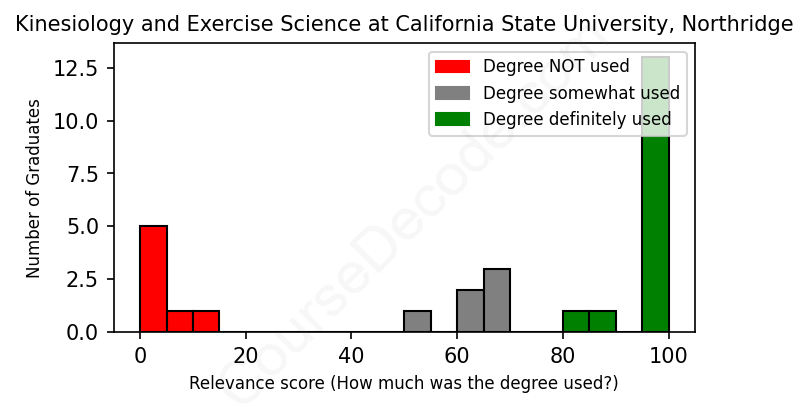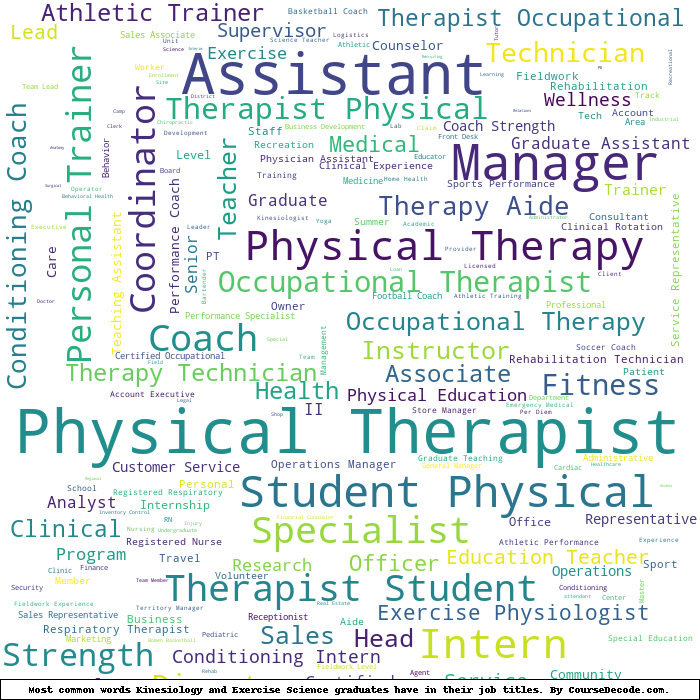
First, some facts. Of the Kinesiology and Exercise Science graduates from California State University, Northridge we've analyzed , here's how many have used (or NOT used) their degree in their career:

These are estimates based on AI analysis of 28 LinkedIn profiles (see below).
The verdict? Slightly below average. Overall, with an average relevance score of 66%, Kinesiology and Exercise Science graduates from California State University, Northridge have a slightly lower likelihood (-1%) of finding work in this field compared to the average graduate across all fields:
And for comparison, here's the chart for all profiles we've looked at across all degrees.
Also, after graduating, 50% of these graduates have pursued further education other than another Bachelor's degree (such as a Masters degree or other), compared to the average across all profiles of 35%. This suggests you may need more than just a Bachelors degree to be competitive as a Kinesiology and Exercise Science graduate.
See the details:
|
Relevance score: 62% We think this person has gone into a career only somewhat relevant to their degree. We think this person has gone into a career only somewhat relevant to their degree.
DEGREE INFOGraduated in 2016 from California State University, Northridge with a Bachelor of Science - BS in Kinesiology and Exercise Science. Also pursued further education since (see below). JOB HISTORY SINCE GRADUATIONFamily Advocate Volunteers of America Jan 2017 - Aug 2019 School and College Counselor  PUC Lakeview Charter High School Aug 2019 - Aug 2021 Program Manager  Los Angeles Valley College Jul 2021 - Mar 2023 Trainer Presenter  Los Angeles Mission College Aug 2022 - Present FURTHER DEGREES DONE SINCE GRADUATINGMaster of Science - MSUniversity of La Verne 2016 - 2018 ABOUTNo information provided. |
The top 10 most common jobs done by the graduates we've analyzed (ranked most common to least) are:
Looking at the job paths of people who graduated with a degree in Kinesiology and Exercise Science from California State University, Northridge, a couple of patterns emerge. Many of these graduates have found their way into roles that are closely tied to the fields of physical therapy, occupational therapy, and fitness training. Positions such as Occupational Therapist, Physical Therapist, and Strength and Conditioning Coach pop up frequently, showing that these roles align well with the skills and knowledge they acquired during their studies. It's clear that for many, their jobs directly utilize the principles of kinesiology and exercise science, especially in health and rehabilitation settings.
However, it's also surprising to see some alumni drifting into unrelated fields. Roles like Store Manager at Burger King or Claims Representative at AAA demonstrate a distinct departure from the core concepts of Kinesiology and Exercise Science. While some jobs may involve skills like customer service or team management, they don’t really tap into the specialized knowledge from their degree. So, overall, while a significant number of graduates are indeed working in relevant and fulfilling positions, there’s a noticeable mix with roles that don't directly connect to what they studied, which might leave some wondering about the applicability of their education in the job market.
Here is a visual representation of the most common words in job titles for Kinesiology and Exercise Science graduates (this is across all Kinesiology and Exercise Science graduates we've analyzed, not just those who went to California State University, Northridge):

From the LinkedIn profiles of graduates from California State University, Northridge who studied Kinesiology and Exercise Science, it seems like these individuals have generally pursued a range of career paths that are often relevant to their field. Graduates typically find their first jobs in roles directly related to health and fitness after graduation. Many start as physical therapy aides, personal trainers, or group fitness instructors, while a significant number move into occupational therapy roles or rehabilitation settings fairly quickly. This suggests a strong beginning for most, with many finding meaningful work related to their degree soon after graduating.
As time goes on, about five to ten years post-graduation, we see a mix. Some graduates stay within the health and fitness industry and progress into more specialized roles like occupational therapists, physical therapists, and strength and conditioning coaches. Others branch out into other fields, like administrative roles or even completely unrelated jobs, such as comedy or management positions in entirely different industries. While not everyone sticks close to kinesiology or exercise science, a solid number do manage to build successful careers that align with their educational background, suggesting that many of these graduates find ways to leverage their degree successfully over time.
Honestly, a Bachelor’s degree in Kinesiology and Exercise Science can be pretty manageable, especially at a place like Cal State Northridge, where the program is designed to be accessible and engaging. You’ll cover a mix of subjects like anatomy, physiology, and movement science, which can sound tough, but if you’re into sports or fitness, you’ll likely find it interesting! The workload might be a bit heavy at times with labs and projects, but it’s generally not seen as as difficult as some other science-heavy degrees. Overall, if you're passionate about the field, it’s totally doable! Just make sure you stay organized and manage your time well.
Most commonly, in the LinkedIn profiles we've looked at, it takes people 5 years to finish a Bachelor degree in Kinesiology and Exercise Science.
So, looking at these Kinesiology and Exercise Science grads from CSU Northridge, it's pretty clear that their earnings have varied a lot. Some of them, like the chiropractors, occupational therapists, and physical therapists, likely make decent money since those professions usually have solid salaries, especially as they gain experience. The folks working in fitness and management roles, like group fitness instructors or store managers, might earn less, especially if they're starting out or juggling multiple gigs. The ones who transitioned into more specialized roles in therapy and rehabilitation seem to be on the right track, salary-wise, while others took a bit of a different path that might not pay as well. Overall, it looks like some are doing really well, while others might be still grinding to make ends meet!
Here is a visual representation of the most common words seen in the "about" section of LinkedIn profiles who have a Bachelor degree in Kinesiology and Exercise Science (this is across all Kinesiology and Exercise Science graduates we've analyzed, not just those who went to California State University, Northridge). This may or may not be useful:

Here are all colleges offering a Bachelor degree in Kinesiology and Exercise Science (ordered by the average relevance score of their Kinesiology and Exercise Science graduates, best to worst) where we have analyzed at least 10 of their graduates: